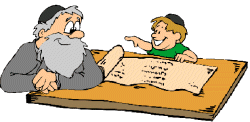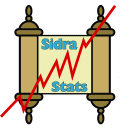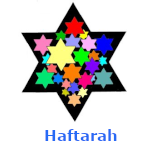VaYishlach
וַיִּשְׁלַח
Gen. 32:4 – 36:43
Jacob meets Esau
Jacob sent messengers ahead of him to his brother Esau, to Edom’s Field in the Seir area. He instructed them to deliver the following message:
“To my lord Esau. Your humble servant Jacob says: I have been staying with Laban, and have delayed my return until now. I have acquired cattle, donkeys, sheep, and slaves, and am now sending word to tell my lord, to gain favor in your eyes.” The messengers returned to Jacob with the report: “We came to your brother Esau, and he is headed toward you. He has 400 men with him.”
Jacob was very frightened and distressed. He divided his people in half forming two camps along with his herds. “If Esau comes and attacks one camp the other will survive.”
Jacob prayed: “HaShem, you told me ‘Return to the land where you were born, and I will make things go well with you.’ I am unworthy of all the kindness that you have shown me. When I crossed the Jordan River I only had my staff, and now I have enough for two camps. Rescue me from the hand of my brother, from Esau. I am afraid of him, for he can come and kill us all – mothers and children alike. You once said ‘I will make things go well with you, and make your descendants like the sand grains of the sea, which are too numerous to count.’”
After spending the night there, he selected a tribute for his brother Esau. The tribute consisted of: 200 female goats, 20 male goats, 200 ewes, 20 rams, 30 female camels and their young, 40 cows, 10 bulls, 20 female donkeys and 10 male donkeys. These he gave to his servants, each a herd by itself. He said to his servants: “Go ahead of me. Keep a space between one herd and the next.”
He gave the first group instructions: “When my brother Esau encounters you, he will ask, ‘To whom do you belong? Where are you going? Who owns all this that is with you?’ You are to reply: ‘It belongs to your servant Jacob. It is a tribute to my master Esau. Jacob himself is right behind us.” Jacob gave the same instructions to all of the groups.
“I will win him over with the gifts that are being sent ahead, then I will face him,” he said, “then he will hopefully forgive me.”
He sent the gifts ahead and spent the night in the camp. In the middle of the night he got up and took is two wives and their handmaidens and his eleven sons and sent them across the Jabbok River shallows. After he had them on the other side of the river he sent the rest of the camp to them.
Jacob remained alone. A stranger appeared and wrestled with him until just before daybreak. When the stranger saw that he could not defeat him, he touched the upper joint of Jacob’s thigh and it became dislocated as he wrestled with the stranger.
“Let me leave!” the stranger said, “Dawn is breaking.”
“I will not let you leave unless you bless me.”
“What is your name?”
“Jacob”
“Your name will no longer be said to be Jacob, but Israel (Yisra’el). You have become great (sar) before HaShem and man. You have won.”
Jacob returned the question: “What is your name?”
“Why do you ask my name?” He then blessed Jacob.
Jacob named the place Divine Face (Peniel). “I have seen the Divine face to face, and my soul has withstood it.” The sun rose and was shining on him when he left Penuel. He was limping because of his thigh.
The Israelites therefore do not eat the displaced nerve on the hip joint (Sciatic nerve) to this very day. This is because the stranger had touched Jacob there.
Jacob looked up and saw Esau approaching with 400 men. He divided the children among Leah, Rachel and their handmaids. Jacob went ahead of them and prostrated himself seven times as he approached his brother.
Esau ran to meet him. He hugged Jacob, and they both wept. Esau looked up and saw the women and children. “Who are these with you?”
“They are the children whom HaShem has been kind enough to grant me.”
The handmaids approached along with their children, and the women bowed down. Leah and her children did the same. Finally, Joseph and Rachel bowed down to him.
“What did you have to do with that whole camp that came to greet me?”
“It was to find favor in your eyes.” answered Jacob.
“I have plenty, my brother,” replied Esau, “Let what is yours remain yours.”
“Please! No!” said Jacob. “If I have gained favor with you, please accept this gift from me. After all, seeing your face is like seeing the face of the Divine, you have received me so favourably. Please accept my welcoming gift. HaShem has been kind to me, and I have all I need.” Jacob thus urged him to accept the gift.
“Let’s get going and move on,” said Esau. “I will travel alongside you.”
“My lord,” replied Jacob, “you know that the children are weak, and I have a responsibility for the nursing sheep and cattle. If they are driven hard for even one day, they will die. Please go ahead of me. I will lead my group slowly, following the pace of the work that I have ahead of me and the pace of the children. I will eventually come to you in Seir.”
“Let me put some of my people at your disposal,” said Esau.
“What for?” replied Jacob. “Just let me remain on friendly terms with you.”
On that day, Esau returned along the way to Seir. Jacob went to Sukkoth. There he build himself a home, and made shelters for his livestock. He therefore named the place Sukkoth.
Arrival at Shechem
When Jacob came from Padan Aram and entered the bounties of Canaan, he arrived safely in the vicinity of Shechem. He set up camp in view of the city. He bought a piece of open land which he set up his tent for 100 kesitahs from the sons of Chamor, chief of Shechem. He erected an altar there, and named it G-d-is-Israel’s-Lord (El Elohey Yisrael).
The Affair of Dinah
Leah’s daughter Dinah, went out to visit some of the local girls. She was seen by Shechem, son of the chief of the region, Chamor the Hivite. He seduced her and violated her. He fell in love with her and tried to make up with her. Shechem said to his father, “Get me this girl as a wife.”
Jacob learned that his daughter Dinah had been violated. His sons were in the field with the livestock, and Jacob remained silent until they came home.
Meanwhile, Shechem’s father, Chamor, came to Jacob to speak with him. Jacob’s sons returned from the field. When they heard what had happened, they were shocked and angry. Shechem had committed an outrage against Israel. Such an act could not be tolerated.
Chamor tried to reason with them. “My son Shechem is deeply in love with your daughter,” he said. “If you would, let him marry her. intermarry with us. You can give us your daughters and we will give you ours. You will be able to live with us, the land will be open to you. Settle down, do business here, and the land will become your property.” Shechem also spoke to Dinah’s father and brothers. “I will do anything to regain your favor. I will give you whatever you ask. Set the bridal price and gifts as high as you like — I will give you what every you demand of me. Just let me have the girl as my wife.”
When Jacob’s sons replied to Shechem and his father Chamor, it was with an ulterior motive. After what had been done to their sister.
“We can’t do that,” they said. “Giving our sister to an uncircumcised man would be a disgrace to us. The only way we can possibly agree is if you would circumcise every male. Only then will we be able to give you our daughters and take your daughters for ourselves. We will be able to live together with you and both of us will become a single nation. But if you do not agree we will leave.”
Their terms seemed fair to Chamor and his son Shechem. Since he desired Jacob’s daughter, the young man lost no time doing it. He was the most respected man in his father’s house.
Chamor and his son Shechem came to the city gate, and they spoke to the citizens of their city. “These men are friendly toward us,” they said. “They live on the land and support themselves profitably from it. The land has more than ample room for them. We will marry their daughters, and give them ours. But it is only if their terms are met that we can become one nation. Every male among us must first be circumcised, just as they are circumcised. Won’t their livestock, their possessions, and all their animals eventually be ours? Let us agree to their conditions and live with them.” All the people who came out to the city gate agreed with Chamor and his son Shechem. The males who passed through the city gate all allowed themselves to be circumcised.
On the third day, when the people were in agony, two of Jacob’s sons, Simeon and Levi, Dinah’s brothers, took up their swords. They came to the city without arousing suspicion and killed every male. They also killed Shechem and Chamor by the sword and took Dinah away with them.
Jacob’s sons came upon the dead, and plundered the city that had defiled their sister. They took sheep, cattle, donkeys, and whatever else was valuable. They also took the women and children as captives.
Jacob said to Simeon and Levi, “You have gotten me in trouble, giving me a bad reputation among the Canaanites and Perizites who live in the land. I have only a small number of men. They can band together and attack and we will all die.” “Should we have allowed this to be done to our sister?” they replied.
Preparations for Beth El
HaShem said to Jacob, “Set out and go up to Beth El. Remain there and make an altar to me, the one who appeared to you when you were fleeing your brother Esau.”
Jacob said to his family and everyone with him, “Get rid of the idols that you have. Purify yourselves and change your clothes. We are setting out for Beth El. There I will make an altar to HaShem, who answered me in my time of trouble, and has been with me on the journey I have taken.”
They gave Jacob all of the idols they had, even the rings in their ears. Jacob buried them under the terebinit tree near Shechem.
They began their journey. The fear of HaShem was felt in all the cities around them and they did not pursue Jacob’s sons. Jacob and all the people with him came to Luz in the land of Canaan — that is to Beth El. He built an altar there and named it Beth El
Beth El
Now that Jacob had returned from Padan Aram, HaShem appeared to him again and blessed him. HaShem said to him, “Your name is Jacob. But your name will not only be Jacob; you will also have Israel as a name.” HaShem named him Israel. HaShem said to him, “I am HaShem. Be fruitful and increase. A nation and a community of nations will come into existence from you. You will sire kings. I will grant you the land that I gave to Abraham and Isaac. I will also give the land to your descendants who will follow you.”
HaShem went up and left Jacob in the place where he had spoken to him. Jacob set up a pillar in the place where HaShem had spoken to him. He offered a libation and poured oil on it.
They moved on from Beth El, and were some distance from Ephrath when Rachel began to give birth. Her labor was difficult. The midwife said to her, “Do not be afraid, this will also be a son for you.” She was dying, and she breathed her last, she named her son Ben-oni (My sorrow’s son). His father called him Benjamin.
Rachel died and was buried on the road to Ephrath, now known as Bethlehem. Jacob set up a monument on her on her grave. This is the monument that is on Rachel’s gave to this very day.
Israel traveled on, and he set up his tent beyond Herd Tower.
Jacob’s Sons & Isaac’s Death
Jacob had twelve sons.
The sons of Leah were Reuben (Jacob’s first born), Simeon, Levi, Judah, Issachar and Zebulun.
The sons of Rachel were Joseph and Benjamin.
The sons of Rachel’s handmaid Bilhah were Dan and Naptali.
The son’s of Leah’s handmaid Zilpah were Gad and Asher.
These are the sons born to Jacob in Padan Aram.
Jacob thus came to father Isaac in Mamre, at Kiryath Arba, also known as Hebron. This is where Abraham and Isaac had resided.
Isaac lived to be 180 years old. He breathed his last and died, and his sons Esau and Jacob buried him.
Esau’s Line
These are the chronicles of Esau, also known as Edom.
Esau took wives from the daughters of Canaan. These were Adah, daughter of Elon the Hittite and Oholibamah, daughter of Anah, daughter of Tziv’on the Hivite. He also married Basemath, daughter of Ishmael and sister of Nebayoth.
Adah bore Esau’s son Eliphaz.
Basemath bore Reuel.
Oholibamah bore Yeush, Yalam and Korach.
Those were Esau’s sons who were born in the land of Canaan.
Esau took his wives, sons, daughters and the rest of his household and belongings and moved to another area away from his brother Jacob. Because all of the wandering livestock could not be supported on the land. Esau settled in the hill country of Seir. There they become a nation called Edom.
Kings of Edom
These are the kings who ruled in the land of Edom before any king ruled over the Israelites.
Bela son of Beor became the king of Edom, and the name of his capital was Dinhava.
Bela died, and he was succeeded as king by Yovev, son of Zerach from Botzrah.
Yovev died, and was succeeded as king by Chusham from the land of the Temanites.
Chusham died, and was succeeded as king by Hadad son of Badad, who defeated Midian in the field of Moab. The name of his capital was Avith.
Hadad died, and was succeeded by Samlah of Masrekah.
Samlah died, and was succeeded by Saul from Rechovouth-on-the-river.
Saul died, and was succeeded by Baal Chanan son of Akhbor.
Baal Canan, died and he was succeeded as king by Hadar. The name of his capital was Pau. His wife was Meheitaval, daughter of Matred, daughter of May Zahav.
This is how Esau was the ancestor of the Edomites.
Haftarah Connection

Obadiah 1.1-21
This week’s Parsha begins with Jacob and Esau meeting. Esau has a small army with him and Jacob is worried.
The Edomites live by the sword. This is true to the blessing that Esau would be the father of a great nation. They oppressed the Jews.
In the Haftara, Obadiah the propphet, a converted Edomite to Judiasm, predicts that Israel will triumph against Edom with the help of HaShem.
Sidra Stats

- Eighth of 54 Sedras in the Torah
- Written on 237 lines in the Sefer Torah
- 153 P’sukim (verses)
- 1,976 words
- 7,458 letters
Next week’s Parashat: VaYeshev


